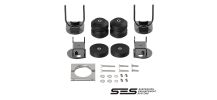Towing an RV requires more than a strong vehicle; it demands skill, understanding, and the right approach. For beginners, the concept of Towing RV can be daunting. It's about connecting your RV to your vehicle and ensuring safety, balance, and control. This guide aims to demystify the process, offering valuable insights and tips for those new to RV towing. We'll explore how to select the correct hitch, the importance of weight distribution, and essential driving techniques to ensure a safe and enjoyable journey.
Rigid Hitch Inc.: Enhancing Your Towing Experience
At Rigid Hitch Inc., we specialize in making your towing experience as smooth and safe as possible. As a leading manufacturer and distributor, we offer a comprehensive range of towing accessories, trailer parts, and truck accessories tailored for various towing needs. Whether you tow a lightweight travel trailer or a heavy-duty RV, our products provide the necessary reliability and durability. With Rigid Hitch Inc., you get more than just equipment; you gain a partner committed to enhancing your towing journey with quality and expertise.
Familiarize Yourself with Your RV's Specifications
Start by reading your RV's owner's manual thoroughly. This comprehensive document provides vital information about your RV, including its dimensions, weight, and towing requirements. Pay particular attention to the Gross Vehicle Weight Rating (GVWR), which indicates the maximum weight your RV can safely carry. Exceeding this limit can lead to instability and safety hazards. Review the manufacturer's recommendations regarding towing equipment and hitch requirements specific to your RV model.
Take note of your RV's dimensions, such as its length, width, and height. Knowing these measurements is essential for safely navigating narrow roads, bridges, and tunnels. It also helps you plan your route and select campgrounds or parking spots that accommodate your RV's size.
Understanding your RV's hitch requirements is crucial for a secure and stable towing connection. Verify the hitch class and weight rating recommended by the manufacturer and ensure that your tow vehicle is equipped with a matching hitch. If your RV has multiple axles, familiarize yourself with the proper weight distribution setup and adjust it to maintain balance and control while towing.
Ensure Your Tow Vehicle is Adequately Equipped
Your tow vehicle is the powerhouse that pulls your RV, and it must be adequately equipped to handle the weight and towing demands. The key to a successful RV towing experience is ensuring that your tow vehicle's capabilities align with your RV's specifications.
Begin by verifying that your tow vehicle's towing capacity exceeds the total weight of your RV, including all passengers, cargo, and fluids. Exceeding your tow vehicle's towing capacity can lead to mechanical strain, reduced control, and safety risks.
Consider upgrading essential components of your tow vehicle to enhance its towing performance. Adequate engine power and torque are essential for maintaining speed and control while towing, especially when navigating hills and challenging terrain. Upgraded suspension and brakes can help ensure stability and safe stopping distances.
Invest in quality towing accessories that match your RV and tow vehicle's requirements. A reliable hitch system, including the hitch class and weight rating, is essential for a secure connection. Towing mirrors improve visibility, allowing you to monitor your RV and the surrounding traffic more effectively. If your RV requires trailer brakes, ensure that your tow vehicle is equipped with a compatible brake controller to enhance braking performance.
Practice Maneuvering and Reversing in a Safe Area
Begin by finding a safe and open area, such as an empty parking lot, where you can practice without the risk of obstacles or traffic. Enlist the help of a spotter to provide guidance and feedback as you practice.
Practice making wide and tight turns to understand your RV's turning radius and handling characteristics. Remember that RVs have a longer wheelbase, which requires wider turns compared to standard vehicles. Experiment with different turning techniques to find the most comfortable and efficient method for your RV.
Backing up your RV can be one of the most challenging aspects of towing. Set up markers or cones to simulate real-life scenarios and practice reversing in a controlled environment. Focus on using your towing mirrors effectively to monitor the RV's position and alignment.
Master the art of parallel parking and maneuvering your RV in confined spaces. These skills will be useful when you encounter tight campsites or parking spaces during your travels.
During your practice sessions, take your time and approach each maneuver with caution. Gradually increase the complexity of your maneuvers as you gain confidence. Remember that practice is the key to building your skills and enhancing your comfort level when towing your RV.
Check and Double-Check All Connections
Start by thoroughly examining the hitch connection. Ensure the hitch ball on your tow vehicle is the correct size and adequately secured to the ball mount. Double-check that the hitch coupler on your RV securely latches onto the ball and that the safety pin is in place. This connection should be tight and free from any play or wobbling.
Next, inspect the safety chains. Cross them underneath the hitch to create a cradle shape, which can catch the trailer tongue in case it becomes disconnected. Ensure the safety chains are tight enough but have enough slack for proper articulation during turns.
Check the trailer lighting and wiring harness to ensure all lights and signals function correctly. This includes brake lights, turn signals, running lights, and hazard lights. Proper lighting is crucial for communicating your intentions to other drivers and ensuring road safety.
Inspect the brake controller if your RV has trailer brakes. Ensure it is properly calibrated and set up to match your RV's braking system. Test the trailer brakes to verify that they engage when you apply them in your tow vehicle. This step is essential for safe and effective braking while towing.
Balance and Secure the Load Inside the RV
Start by distributing the weight evenly inside the RV. Place heavy items low and towards the front of the RV, near the axles, to minimize the impact on the trailer's tongue weight. Use proper storage solutions and tie-downs to prevent items from shifting during transit.
Pay attention to your RV's Gross Vehicle Weight Rating (GVWR), the maximum weight your RV can safely carry, including all passengers and cargo. Exceeding this limit can lead to stability problems and safety risks. Use a bathroom scale or consult a professional to ensure your RV's weight is within acceptable limits.
Secure all loose items, such as dishes, appliances, and personal belongings, to prevent them from shifting on the road. Use non-slip mats and straps to keep items in place during transit.
Check the tire pressure of your RV's tires, including the spare, to ensure they are properly inflated according to the manufacturer's recommendations. Proper tire pressure is essential for stability and safe towing.
Plan Your Route with RV Size in Mind
Begin by using a navigation app or GPS specifically designed for RVs. These tools can help you avoid unsuitable routes for your RV's size and weight. They often provide information on low-clearance bridges, narrow roads, and sharp turns, allowing you to choose the most RV-friendly path.
Before starting your journey, research and list RV-friendly campgrounds or RV parks. Ensure that these locations can accommodate your RV's size and offer amenities such as pull-through sites, full hookups, and adequate space for maneuvering. This planning prevents the stress of finding a suitable spot at the last minute.
Consider your travel preferences and needs when planning your route. If you prefer scenic drives and outdoor attractions, look for RV-friendly routes that offer beautiful landscapes and recreational opportunities. On the other hand, if you're focused on reaching your destination quickly, choose highways and interstates that are RV-accessible and have fewer traffic restrictions.
Adjust Your Driving for the Added Weight and Size
Driving an RV towing trailer or a fifth wheel requires adjustments to your driving style due to your rig's added weight and size. Proper driving techniques are essential for safety, stability, and overall comfort during your journey.
First and foremost, allow for a longer stopping distance. RVs are significantly heavier than standard vehicles, and bringing them to a complete stop takes longer. Maintain a safe following distance from the car in front of you, and avoid tailgating to provide ample time for braking.
Practice smooth and gradual acceleration and deceleration. Sudden movements, such as rapid acceleration or hard braking, can lead to instability and sway. Accelerate slowly from a stop and apply the brakes gently to maintain control.
Be mindful of your RV's extended length when changing lanes or merging onto highways. Always use your towing mirrors to monitor traffic alongside and behind your RV. Signal your intentions well in advance to allow other drivers to adjust their speed and position accordingly.
When ascending steep grades or hills, downshift to lower gears to maintain speed and reduce strain on your tow vehicle's brakes. Avoid riding the brakes continuously, as it can lead to overheating. When descending, use engine braking and downshifting to control your speed and prevent brake overheating.
Gear Up for the Road with Rigid Hitch Inc.
Ready to hit the road with your RV? Equip yourself with the best in the business. Rigid Hitch Inc. offers extensive Towing RV accessories and parts to ensure your top-notch towing experience. Our products, ranging from advanced trailer hitches to essential towing accessories, cater to light and heavy-duty needs. Trust our expertise to guide you in choosing the right equipment for your RV adventure. Visit Rigid Hitch Inc. today and take the first step towards a safe and memorable towing journey.







